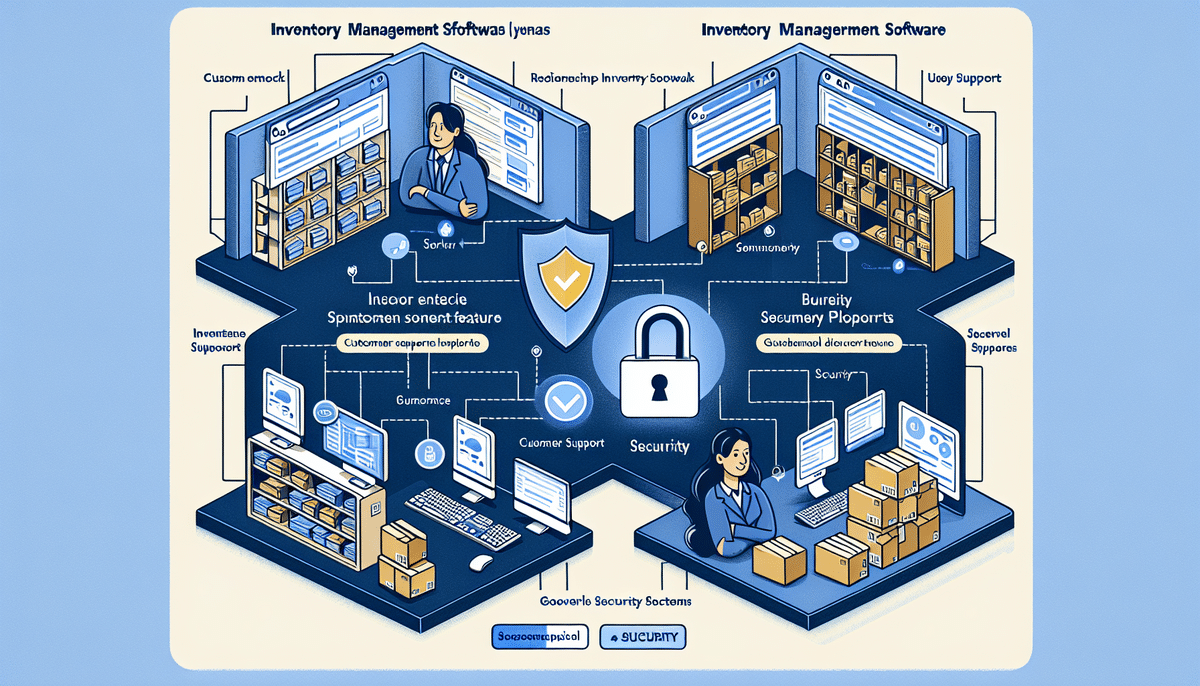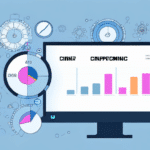If you're in the market for inventory management software, you've likely come across both Cin7 and Fishbowl Inventory. Both solutions offer a wide range of features and benefits, but which one is right for your business? In this article, we'll provide an in-depth comparison of Cin7 and Fishbowl Inventory, covering everything from features and pricing to ease of use and customer support.
An Overview of Cin7 and Fishbowl Inventory
Before diving into the specifics, it's essential to understand the core offerings of each solution. Cin7 is a cloud-based inventory management system tailored for small to medium-sized businesses. It provides functionalities such as inventory tracking, order management, and comprehensive reporting and analytics. On the other hand, Fishbowl Inventory is a locally-installed solution that offers similar features but is particularly geared towards small businesses with specific manufacturing and production needs.
While both Cin7 and Fishbowl Inventory offer robust inventory management capabilities, they cater to slightly different business requirements. For instance, Cin7 excels in integrating with a wide array of e-commerce platforms, making it ideal for businesses with significant online sales channels. In contrast, Fishbowl Inventory offers more advanced manufacturing and production management features, making it a better fit for businesses that manufacture their own products.
Features and Benefits
Cin7 Features and Benefits
Cin7 offers a comprehensive suite of features designed to streamline inventory management:
- Inventory Tracking: Monitor stock levels in real-time and set up automatic reordering to prevent stockouts.
- Order Management: Streamline the order fulfillment process across multiple sales channels.
- Reporting and Analytics: Utilize detailed reports to track business performance and identify growth opportunities.
- Multi-Channel Sales Management: Sell products across platforms like Amazon, eBay, and Shopify from a single dashboard.
- Accounting Integrations: Seamlessly integrate with accounting software such as Xero and QuickBooks, reducing manual data entry and errors.
According to a Gartner report, businesses using Cin7 have reported a 20% increase in operational efficiency due to its integrated features.
Fishbowl Inventory Features and Benefits
Fishbowl Inventory is renowned for its advanced inventory and manufacturing capabilities:
- Automatic Reordering: Ensure stock levels are maintained automatically, reducing the risk of inventory shortages.
- Advanced Inventory Tracking: Track inventory movements across multiple locations with precision.
- User-Friendly Interface: Navigate through an intuitive dashboard that displays key metrics like stock levels and sales trends.
- Comprehensive Integrations: Connect with business software including QuickBooks, Salesforce, and Shopify.
- Manufacturing Management: Manage production processes efficiently with features tailored for manufacturing businesses.
As highlighted in a Software Advice review, Fishbowl Inventory users have experienced a 15% reduction in inventory holding costs due to its precise tracking and reordering capabilities.
Pricing Comparison: Cin7 vs Fishbowl Inventory
Pricing is a critical factor when choosing inventory management software. Here's a comparison based on the latest available data:
- Cin7: Offers tiered pricing plans starting at $299 per month for up to 5 users. Additional features and integrations may incur extra costs.
- Fishbowl Inventory: Provides a perpetual licensing model starting at $4,395 for a single-user license. Subscription-based pricing may also be available for certain features.
It's important to consider the total cost of ownership, including any additional fees for add-ons or integrations. For businesses planning long-term use, Fishbowl's perpetual license might be more cost-effective compared to Cin7's monthly subscription model.
According to industry pricing data from Capterra and Capterra, both platforms offer scalable pricing to accommodate growing businesses.
Ease of Use: Cin7 vs Fishbowl Inventory
User experience plays a significant role in software adoption. Cin7 boasts a more intuitive and user-friendly interface, primarily because it is cloud-based. This allows users to access the system from anywhere with an internet connection, facilitating remote management.
In contrast, Fishbowl Inventory is locally installed, which might present a steeper learning curve for those unfamiliar with on-premise systems. However, once set up, Fishbowl offers a robust and customizable interface tailored to specific business needs.
Feedback from users on platforms like G2 Crowd and G2 Crowd indicates that Cin7 generally receives higher marks for ease of use, while Fishbowl is praised for its extensive customization options despite a more complex initial setup.
Integration Capabilities: Cin7 vs Fishbowl Inventory
Integrations are crucial for ensuring seamless business operations. Both Cin7 and Fishbowl Inventory offer integrations with popular accounting, eCommerce, and shipping platforms, but they differ in scope and complexity.
Cin7 provides a wide range of easy-to-setup integrations with platforms like Shopify, Magento, and Amazon, facilitating multi-channel sales management directly from its dashboard.
Fishbowl Inventory, while offering integrations with systems like QuickBooks and Salesforce, tends to have more complex integration processes which might require additional setup or customization.
According to a Software Advice guide, Cin7's integration capabilities make it a preferable choice for businesses looking for quick and easy connectivity with their existing tools.
Conversely, Fishbowl's extensive integration options cater to businesses that require tailored solutions, especially those with complex supply chain or manufacturing processes.
Customer Support and Security
Customer Support
Effective customer support can significantly impact the user experience:
- Cin7: Offers comprehensive support through phone, email, and live chat. Additionally, users have access to a detailed knowledge base and a variety of online resources to troubleshoot common issues.
- Fishbowl Inventory: Provides support via phone and email. While it lacks live chat, Fishbowl offers extensive online training sessions and webinars to help users maximize the software's potential.
User reviews on platforms like Trustpilot highlight Cin7's responsive and helpful support team, whereas Fishbowl Inventory users appreciate the depth of training resources despite the absence of live chat support.
Security Measures
Data security is paramount for inventory management systems. Both Cin7 and Fishbowl Inventory implement robust security measures:
- Cin7: Utilizes SSL encryption for data transmissions and offers two-factor authentication (2FA) to enhance account security. Additionally, Cin7 includes IP whitelisting, allowing businesses to restrict access to specific IP addresses.
- Fishbowl Inventory: Employs AES encryption to secure data and also supports two-factor authentication for user accounts.
However, Cin7 has an edge with its IP whitelisting feature, providing an extra layer of security by limiting access to trusted sources. This is particularly beneficial for businesses that handle sensitive inventory data.
Refer to the Cin7 Security Page and Fishbowl Security Information for detailed insights into their security protocols.
Reporting and Analytics: Cin7 vs Fishbowl Inventory
Advanced reporting and analytics are essential for informed decision-making:
- Cin7: Offers user-friendly and highly customizable reporting tools. Users can generate reports on inventory levels, sales performance, and operational efficiency with ease, allowing for quick insights and actionable data.
- Fishbowl Inventory: Provides more in-depth analytics focusing on inventory management and supply chain operations. While its reporting tools are powerful, they can be more complex to navigate compared to Cin7.
Businesses with complex supply chains or those requiring detailed inventory tracking may find Fishbowl's analytics more beneficial. Conversely, companies prioritizing ease of use and customizable reporting might prefer Cin7.
Industry studies from sources like Software Advice indicate that the choice between these two often hinges on the specific analytics needs of the business.
Real-life Examples: How Businesses are Using Cin7 and Fishbowl Inventory
Understanding how real businesses utilize these inventory management systems can provide practical insights:
- Cin7 Example: A small clothing manufacturer uses Cin7 to manage inventory across their website and several retail stores. The centralized system streamlines their order fulfillment, ensuring accurate stock levels and timely restocking.
- Fishbowl Inventory Example: A medical supply company employs Fishbowl to track inventory across multiple locations. The barcode scanning feature enhances accuracy in receiving and shipping, reducing errors and improving order fulfillment efficiency.
- Food and Beverage Distributor: Utilizing Cin7, a distributor manages inventory across multiple warehouses, tracks product expiration dates, and analyzes sales data to minimize waste and optimize inventory levels.
These examples illustrate how both Cin7 and Fishbowl Inventory can be tailored to meet diverse business needs, enhancing operational efficiency and accuracy.
The Future of Inventory Management Software: Roadmap for Cin7 and Fishbowl Inventory
Both Cin7 and Fishbowl Inventory are continually evolving to meet the changing demands of businesses:
- Cin7: Plans to expand its integrations with additional e-commerce platforms and shipping providers. There's also an emphasis on incorporating blockchain technology for enhanced supply chain transparency and security.
- Fishbowl Inventory: Aims to improve its mobile application capabilities, expand integrations with various accounting software, and enhance its reporting and analytics tools for more comprehensive data insights.
Staying updated with their development roadmaps ensures that businesses can leverage the latest features and maintain a competitive edge in inventory management.
Alternatives to Cin7 and Fishbowl Inventory: Other Top-Rated Solutions
If Cin7 and Fishbowl Inventory don't seem to align perfectly with your business needs, there are several other reputable inventory management solutions to consider:
- TradeGecko (Now QuickBooks Commerce): Offers robust inventory and order management features, particularly suited for e-commerce businesses.
- Ordoro: Known for its shipping and dropshipping capabilities, making it ideal for businesses with complex shipping needs.
- Zoho Inventory: Provides comprehensive inventory management at a competitive price point, suitable for small to medium-sized businesses.
Each of these alternatives has its unique strengths, so it's advisable to evaluate them based on your specific business requirements and budget.
Final Thoughts: Making the Right Choice Between Cin7 and Fishbowl Inventory
Choosing the right inventory management software is a pivotal decision for any business, impacting operational efficiency, accuracy, and scalability. By thoroughly evaluating your business's specific needs and comparing solutions like Cin7 and Fishbowl Inventory, you can make an informed choice that aligns with your operational goals.
Consider prioritizing features such as inventory tracking accuracy, order management efficiency, reporting capabilities, and integration flexibility. Additionally, factor in the importance of ease of use and the quality of customer support, as these can significantly influence the overall user experience and the software's effectiveness in your daily operations.
Ultimately, both Cin7 and Fishbowl Inventory offer robust solutions tailored to different business models. Assessing your unique requirements and leveraging trial periods or demos can further aid in selecting the inventory management system that best fits your business's evolving needs.




















